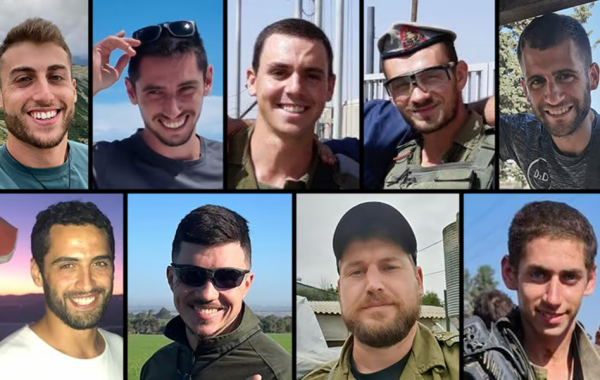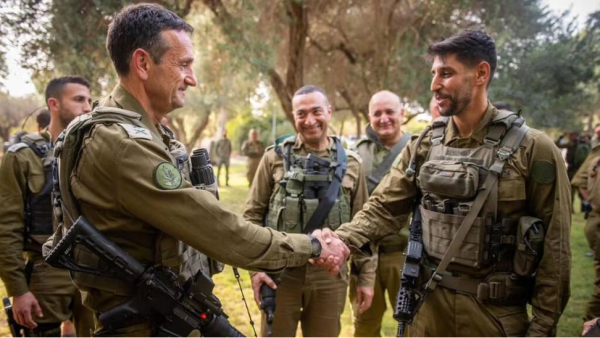By Leah Garber
There are mornings when it is impossible to get out of bed. Not only because of the warmth and comfort it offers, but mainly because of the fear of what the day will bring…
Today was one of those mornings.
We went to sleep last night with a heavy feeling, after we heard, although not yet published in the media, that several soldiers were killed in an explosion near a strategic tunnel in the central Gaza Strip. This news, even though it was only a rumor at the time, immediately paralyzed us and interrupted our plans for the rest of the evening.
Our thoughts began to wander: At which door is the knock being heard now? Which family’s life is about to change forever? Where will bereavement, an uninvited guest, dwell tonight, and who are the newest angels paving their way through stormy skies to their eternal rest?
Is there no limit to the number of tenants who arrive at the gates of heaven? No capacity quota?
The best fill military cemeteries. Israel’s soil embraces her sons and daughters and begs for a break. She has reached her limit and cannot contain any more.
Tombstone craftsmen are tired, their backs bent in grief, refuse to carry more and more stones. Florists’ fingers are calloused. Never have they designed so many mourning bouquets. They beg for a respite, to resume designing cheerful, colorful birthday bouquets, not the ones laid painfully on a mound of earth.

In all the pictures the soldiers are so beautiful, always smiling. It’s not a cliché to say that the best go; it’s the reality. The problem is that all the soldiers are all so fine, filling our hearts with pride.
They are all so talented—artists, musicians, scientists, scholars, singers. Who are they singing to now? Who is elated by their mellow melodies? Whose heart are they touching with such emotions?
Amid the fighting, they pause for an interview. Between shelling and shooting, they stop for a moment to smile at the camera. They all have a uniform message, one that has been repeated for 95 days: “We are here to win. Home will wait, work can wait, we are here until we complete the task, until all 136 hostages are released, and we can ensure peace for the residents of the south.”
They are tired, exhausted really, but always smiling with bright eyes, always full of faith, knowing this is a just fight, a task of the utmost importance: to defeat Hamas. And they always end with this: “Thanks to my wife who is the real hero. I love you all. Am Yisrael Chai.”
It’s heartbreaking to see those who were interviewed just a few days ago—determined, strong, inspiring—are today’s images of the fallen, the newest additions to the endless bereavement list.
William Shakespeare’s quote, “All the world’s a stage…” from “As You Like It,” takes on a chilling meaning today. Idan Amedi, who plays Sagi Tzur, the star of the successful Israeli television series, “Fauda,” was seriously injured in the fighting in Gaza yesterday. Idan, a popular and beloved Israeli actor, is a fighter both on and off the screen. He joined the fighting on the war’s first day, and ever since, he has been documenting the fighting and conveying messages of unity. It’s not every day that a fictional character aligns with his real-life actor, and it’s not every day that a celebrity stays away from the spotlight, following military commanders instead of the show’s director and producer. If only the world was a stage, where just like in “Fauda,” the “injured” actor can wipe off the red color from his face and “return” to life…”
In one of his most recent interviews, Idan asked the public to continue to demonstrate the unity, solidarity, and brotherhood that—more than anything—has characterized the Israeli people since October 7, and for politicians to stop interfering, dividing, and slandering the populace.
A talented singer, one of Idan’s favorite songs is “Fighters Pain,” which has a new meaning today.

With fighters like Idan—for whom we pray for a full and speedy recovery along with all the others who risk their lives for our sake—our nation is so much better and more deserving than its leaders.
God, how much longer?
How many more beautiful, smiling faces will be added to bleeding, painful list? When will we enjoy a quiet evening, have a nightmare-free night, and wake up to a new morning without fear?
When will our prayers be answered, and rains of blessing wash away the sorrow?
Together, united, we will overcome.
Leah Garber is a senior vice president of JCC Association of North America and director of its Center for Israel Engagement in Jerusalem.